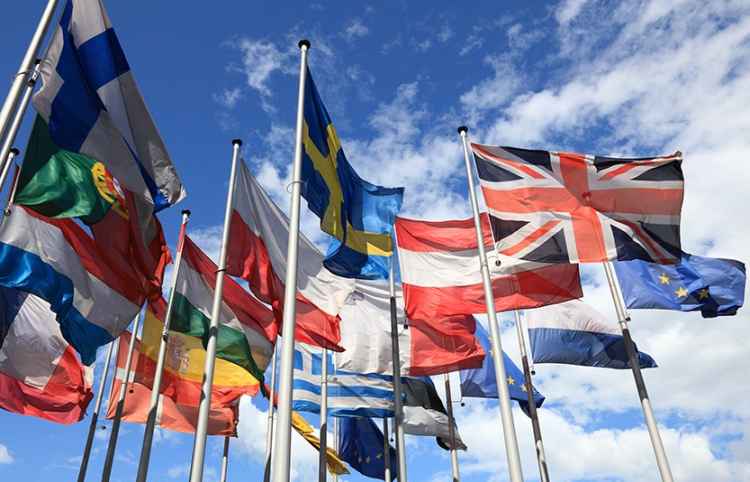One-third of startups in Europe are vulnerable to the current COVID-19 crisis, report finds

• Dealroom.co estimates that one-third (6,000) of European tech companies are ‘vulnerable’ because of the crisis
• Venture capital investments slowed in March
• Startups go into the crisis, having had their best year ever in 2019
• While the failure rate of startups is always high, Europe’s lockdown puts many startup jobs at risk
• But the crisis will also create new opportunities for a fifth of startups
• Venture capital funds also still have funds to deploy, with record levels of ‘dry power’
• European Startups is a joint project launched by Dealroom.co and Sifted.eu and supported by the European Commission
• Its mission is to accelerate Europe’s startup economy to the next level by providing data and insight that can drive decisions and policy-making
EuropeanStartups.co, a new initiative supported by the European Commission to provide macro-level intelligence about Europe’s startup economy, today reveals the impact the coronavirus pandemic is having on the early-stage tech ecosystem across the trading bloc. Startups from Lisbon to Stockholm, from Dublin to Budapest, have been rocked by the current crisis and are facing a threat to their survival, depending on their sector and ability to withstand the next few months.
The insights into the impact on the European early-stage tech sector are published to coincide with the launch of European Startups, a project aimed at propelling Europe’s startup economy to the next level through online data, research, and events. The project’s inaugural report, “What does it take? How can Europe’s startup ecosystem recover from the current crisis”, looks at how fit the ecosystem is to withstand the unprecedented crisis, which threatens hundreds of thousands of jobs across the 27 EU states.
Pēteris Zilgalvis, Head of Unit for Digital Innovation and Blockchain in the Digital Single Market Directorate and Co-Chair of the European Commission FinTech Task Force, said: “In just three weeks Europe has effectively shut down much of the infrastructure that it has taken for granted for decades. This change is both destroying traditional business models and creating new opportunities, often for emerging tech companies.”
“Right now we need to identify the opportunities for and correctly understand the threats to European startups so that we can create policy and make decisions that help to continue the progress that has been made in recent years to create a healthy, ambitious tech sector across the EU-27. Fortunately the European tech ecosystem faces this crisis from a position of strength, having raised record levels of capital in 2019 and demonstrated strong levels of growth. The coming months will be a huge challenge to the startup sector, but it is more than capable of rising to it.”
A third of startups are ‘vulnerable’ to the current crisis
Europe has made significant strides in building a strong and ambitious tech sector in recent years. Over 100 venture backed companies have reached a $1 billion valuation and founders have global ambitions, as proven by the successful exits and IPOs of companies including Adyen, Spotify and Farfetch. In 2019, European startups, including those in the UK, raised €38.8bn in venture capital, up 42.6% on 2018’s €27.2bn.
Analysis of Europe’s 18,000 venture capital-backed companies suggests that the businesses fall into one of four categories: those for whom the crisis is net positive (food delivery, healthtech, logistics and collaboration tools including video conferencing); those for whom it is defensible (frontier tech, gaming, streaming, martech and fintech companies); those who are vulnerable (lending, proptech and fashion tech): and those who are most affected (travel tech and mobility). Dealroom.co estimates that one third (6,000) of European tech companies fall into the most affected and vulnerable category, while roughly half (8,600) will fall into the defensible category and a fifth (2,600) are likely to see net benefits.
The challenges for each category are starkly different. Companies for whom the crisis is net positive will also have to manage rapid growth and respond effectively to surging levels of demand while maintaining supply chains and customer satisfaction. For the majority of companies in the middle category, there will be operational challenges, a shrinking lead pipeline, heightened cash awareness and runway worries. In the most affected category (14%), companies could see revenue fall to zero and in some cases may collapse.
Valuations have fallen
It is vital to remember that even in a normal business environment, more startups will fail than succeed. While listed tech companies have seen their values fall, sometimes by as much as 30 to 40%, startup values are likely to see slightly lower reductions in value. The high mortality rate of startups means it is vital to make sure that any government support for the sector is targeted at those companies that would, in usual circumstances, have a strong chance of succeeding.
Jobs by country/ city
The fate of the European startup sector, which saw record levels of venture capital investment in 2019, matters because these fast-growing early stage businesses are Europe’s number one growth engine for jobs, as well as providing a pipeline of companies capable of growing into global tech brands in years to come. Startups across Europe provided approximately 2m jobs in 2019 and are adding more new jobs each year than any individual sector.
London is the city with the greatest population working in startups (290,000) but Paris has around 100,000 employed in the sector and Berlin has 78,000. Cities like Amsterdam have 48 startup jobs per 1,000 inhabitants, while Stockholm has 38 per 1,000 inhabitants. Right across the EU, job creation in the tech sector was growing more than 10% per year up until the end of the first quarter of 2020.
Starting from a position of strength
The European tech sector has seen escalating investment over the last five years. Risk appetite had started to match that seen in other regions, notably the US. Since 2013, there have been €223bn worth of venture capital-backed exits, which has also helped to create a profitable and sustainable ecosystem, and give venture capital firms more confidence in Europe’s tech sector. This resulted in greater availability of European capital than ever before, with more US and Asian investors active in Europe (including SoftBank, Temasek, Sequoia and Insight Partners), greater appetite from corporate investors, both international and European and increased government support.
As the European ecosystem matured, there were more mega-rounds, leading to a winner-takes-all approach from some investors. This in turn led to a war for talent, which pushed up salaries. Northvolt saw Europe’s first $1bn investment round in 2019, and companies including Deliveroo, Greensill, Babylon and Veeam all raised rounds in excess of half a billion dollars each.
Dealroom data shows that venture capital funds made fewer investments in March, but with €2bn invested this was not exceptionally low. Further clarity around the impact of the pandemic on venture capital investing will become clearer in subsequent months.
Successful companies can come from anywhere
Since the year 2000, Europe has produced 200 unicorns or private companies with a valuation of at least $1bn, from no fewer than 18 countries. There are over 300 emerging European future unicorns. The spread of successful companies proves that market-leading businesses can come from anywhere.
A light at the end of the tunnel
While it is inevitable that some will calculate the coronavirus outbreak in terms of lost revenue, uncertainty and lower valuations, it is also a boon for online companies and is accelerating the ongoing digital and omnichannel shift that has occurred in recent years. This presents huge opportunities for tech founders and startups to help enable this shift, while providing impetus for legacy industries to prioritise digital transformation.
Avi Meir, TravelPerk Co-founder & CEO, comments: “The current crisis has affected us all, but I’m confident that the tech sector will not just survive but, eventually, thrive again. The European tech ecosystem was in a good place right up to the start of March, with companies raising money and hiring in droves. The crisis is exposing many areas where tech-driven solutions could help people, society and business. I am confident that in time we will be able to get back to business and will make even faster progress than we did before.”
Kat Borlongan, Director of La French Tech, comments: “Policy-making without data is like driving blind folded. Not ideal when you have a crisis that needs you to floor the gas pedal. Europeanstartups.co comes at a time pro-startup governments will need it most.”
Tom Wehmeier, Partner at Atomico said: “Dealroom have been an integral partner of our annual State of European Tech report since the early days. Meanwhile, Sifted has become an important voice in European tech. We’re excited to see them joining forces to combine data and journalism to provide critical insights on the development of the European tech ecosystem. It could not be more timely.”
Saul Klein, Partner at LocalGlobe comments: “You need great data to properly understand, grow and benchmark startup ecosystems. Dealroom and Sifted have been laser focussed on doing a great job at a city, regional, national and continental level helping to shine a light on the amazing companies being developed in Europe as well as the increasingly robust and sophisticated ecosystems that support them.”
Daniel Keiper-Knorr, Partner at Speedinvest, comments: “European collaboration across national borders that unites public and private investors is needed now more than ever. As a VC founded 10 yrs ago in Vienna that is now invested in 28 countries across Europe, we know this all too well. Central tech hubs like London, Paris, Berlin, Madrid and Stockholm are important, no question. But good entrepreneurs and talent grow everywhere and we cannot afford to lose them. The coming weeks are of critical importance. How we respond could potentially impact the economy for the next decade. We owe nothing but our very best to the current and future generation of entrepreneurs.”
The European Startups.co report also covers:
• How the crisis could set back recent progress in minimising the gap between the US, Asia and Europe
• How there’s still a large gap between Europe and the US and Asia. For instance, Europe’s most valuable VC-backed companies – Spotify, Adyen, Delivery Hero and Zalando – are together worth just $77bn v. the US’s five biggest tech companies (Facebook, Alphabet, Amazon, Microsoft, Apple), worth $4.9tn
• Europe’s ecosystem is still fragile because many companies are still at an early stage
• More than a third (37%) of investments in Europe went into rounds valued between €1m and €5m
• Only 12% of investment rounds worth more than $100m are made in Europe, compared with 48% in North America and 36% in Asia
• Venture capital funding per capita, one measure used to compare the investment in tech sectors around the world, is lower on average in Europe than it is in the US, in Israel, in Sweden and in the UK
• This shows that there is considerable scope for the EU-27 to attract higher levels of global tech investment
EuropeanStartups.co will create a new platform for macro-level trends and insights to help direct funding decisions, drive discussion and policy making around the current crisis, and the wider ecosystem. You can register to join the platform, and be the first to receive reports from European Startups, presented by Dealroom and Sifted, with support from the European Commission, here.




